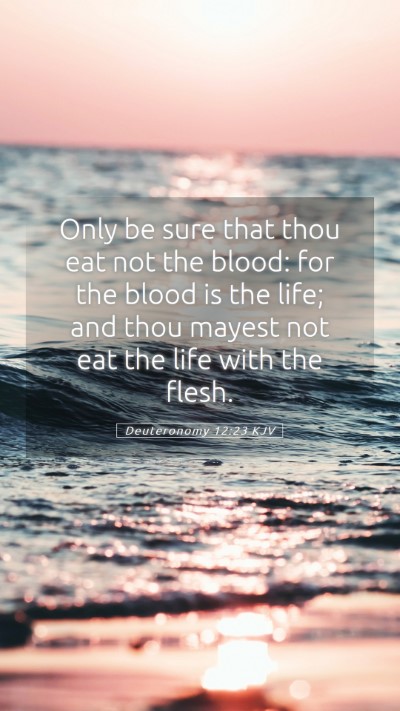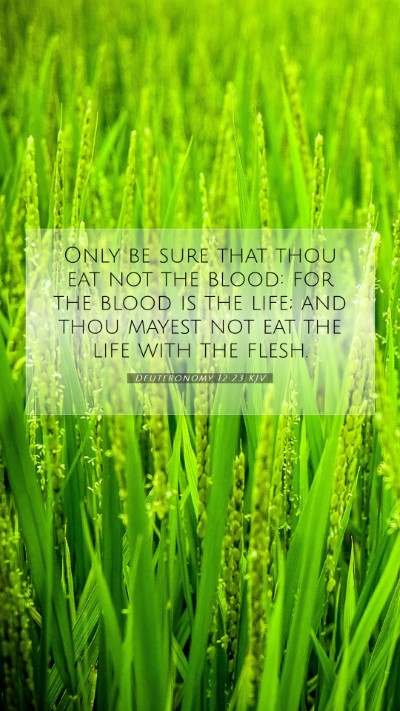Understanding Deuteronomy 12:23
Deuteronomy 12:23 states:
"Only be sure that thou eat not the blood: for the blood is the life; and thou mayest not eat the life with the flesh."
Bible Verse Explanation
This verse reflects the importance of blood in biblical law and its significance in relation to life itself. Blood is presented as sacred, representing not only physical life but also the covenant relationship between God and His people.
Bible Verse Meanings and Interpretations
- Matthew Henry's Commentary: Henry emphasizes the prohibition of consuming blood. He elucidates that blood symbolizes life and, therefore, should not be eaten but offered to God in sacrifice. This reinforces the idea that life belongs to God, and consuming blood would violate divine order.
- Albert Barnes' Notes: Barnes notes that this commandment illustrates God’s sensitivity to life. The prohibition serves as a reminder to the Israelites of God’s sovereignty over life and death. He interprets blood as a powerful symbol of atonement, essential in sacrificial rituals.
- Adam Clarke's Commentary: Clarke expounds that the blood serves both a practical purpose (as it is linked to hygiene and health) and a spiritual one, which connects to the sacrificial system in the Old Testament. He asserts that the life of the flesh is tied to the blood and signifies the utmost respect for life prescribed by God.
Scriptural Analysis and Reflection
The prohibition against eating blood is not merely a dietary rule but a profound statement about the sanctity of life. In the ancient Near East context, where blood might have been consumed in rituals associated with worship or pagan practices, this command sets Israel apart as a holy nation dedicated to God.
Significance of Blood in Scripture
Blood plays a critical role throughout the Scriptures, symbolizing atonement, covenant, and life. The Old Testament sacrificial system relied heavily on blood offerings, which foreshadowed the ultimate sacrifice of Christ in the New Testament.
Cross References
- Leviticus 17:10-14: This passage further discusses the prohibition of eating blood and its connection to life and atonement.
- Genesis 9:4: God commands Noah not to consume blood, reinforcing the sanctity of life as established at creation.
- Hebrews 9:22: The New Testament reflects on the necessity of blood for the remission of sins, highlighting the ultimate sacrifice of Jesus.
Applications for Daily Life
As we explore the meaning of Bible verses like Deuteronomy 12:23, we are reminded of the deep respect that should be afforded to life itself. The teachings encourage us to:
- Honor the value of life in our interactions and relationships.
- Recognize the significance of sacrifice, particularly in our spiritual practices.
- Engage in Bible study groups to deepen understanding and application of scripture.
Conclusion
Understanding Scripture requires a holistic approach that considers both the historical context and spiritual lessons inherent in the text. The prohibitions in Levitical laws, such as that found in Deuteronomy 12:23, serve as vital reminders of our covenantal relationship with God and the importance of viewing life through a sacred lens.
Related Study Topics
- Biblical exegesis of Old Testament laws
- The significance of sacrifice in the Old and New Testaments
- Exploring the symbolism of blood throughout scripture


